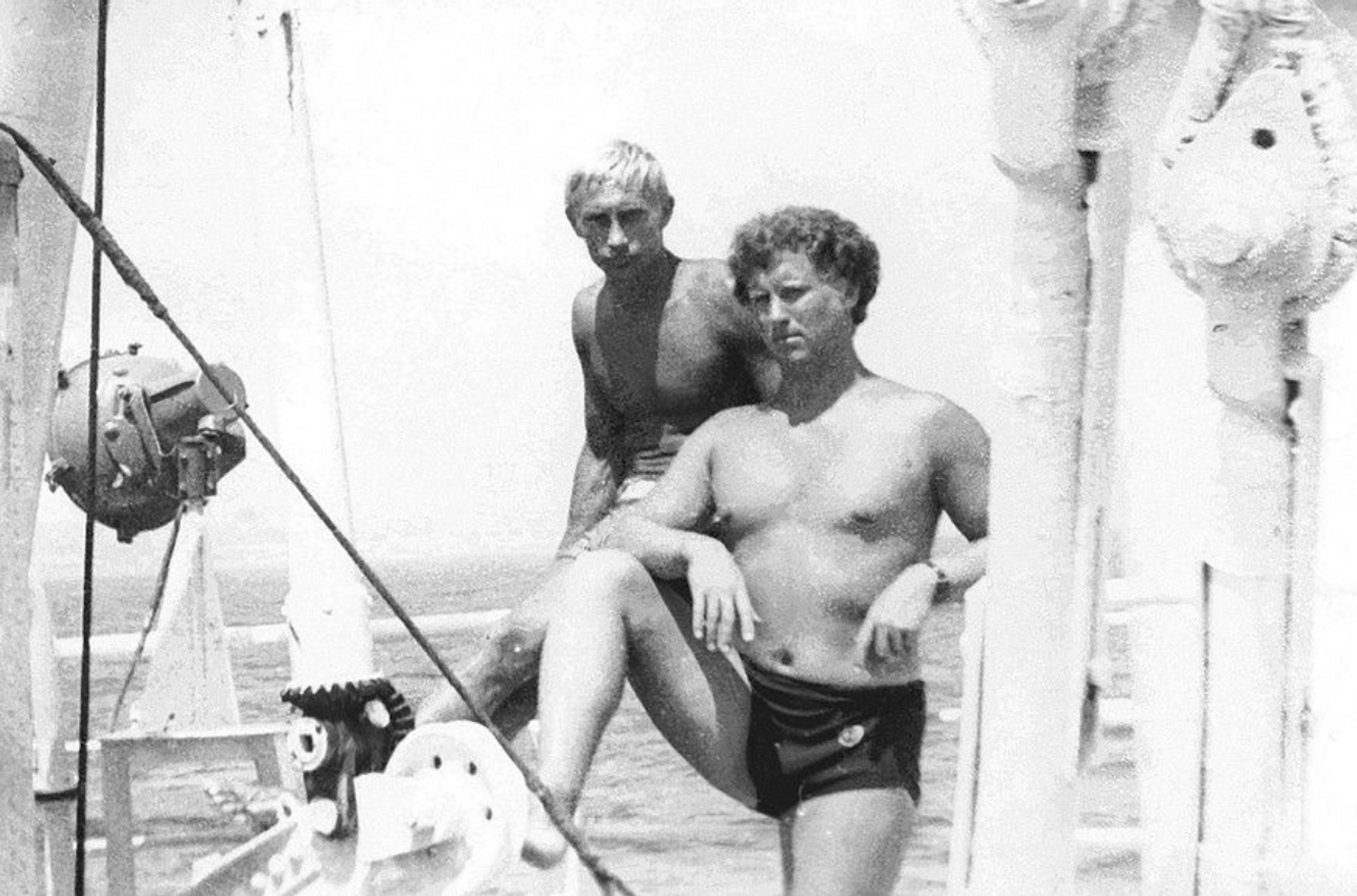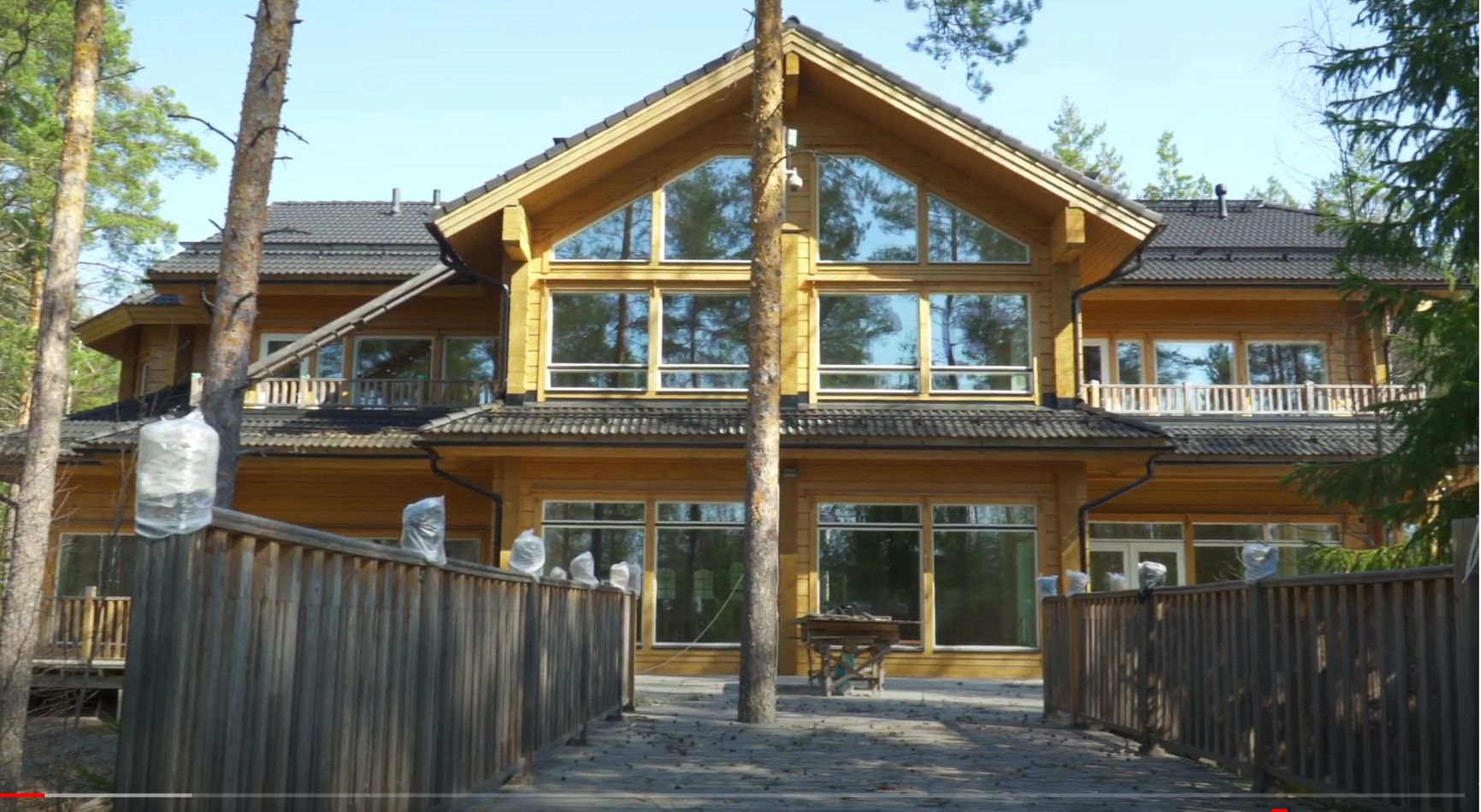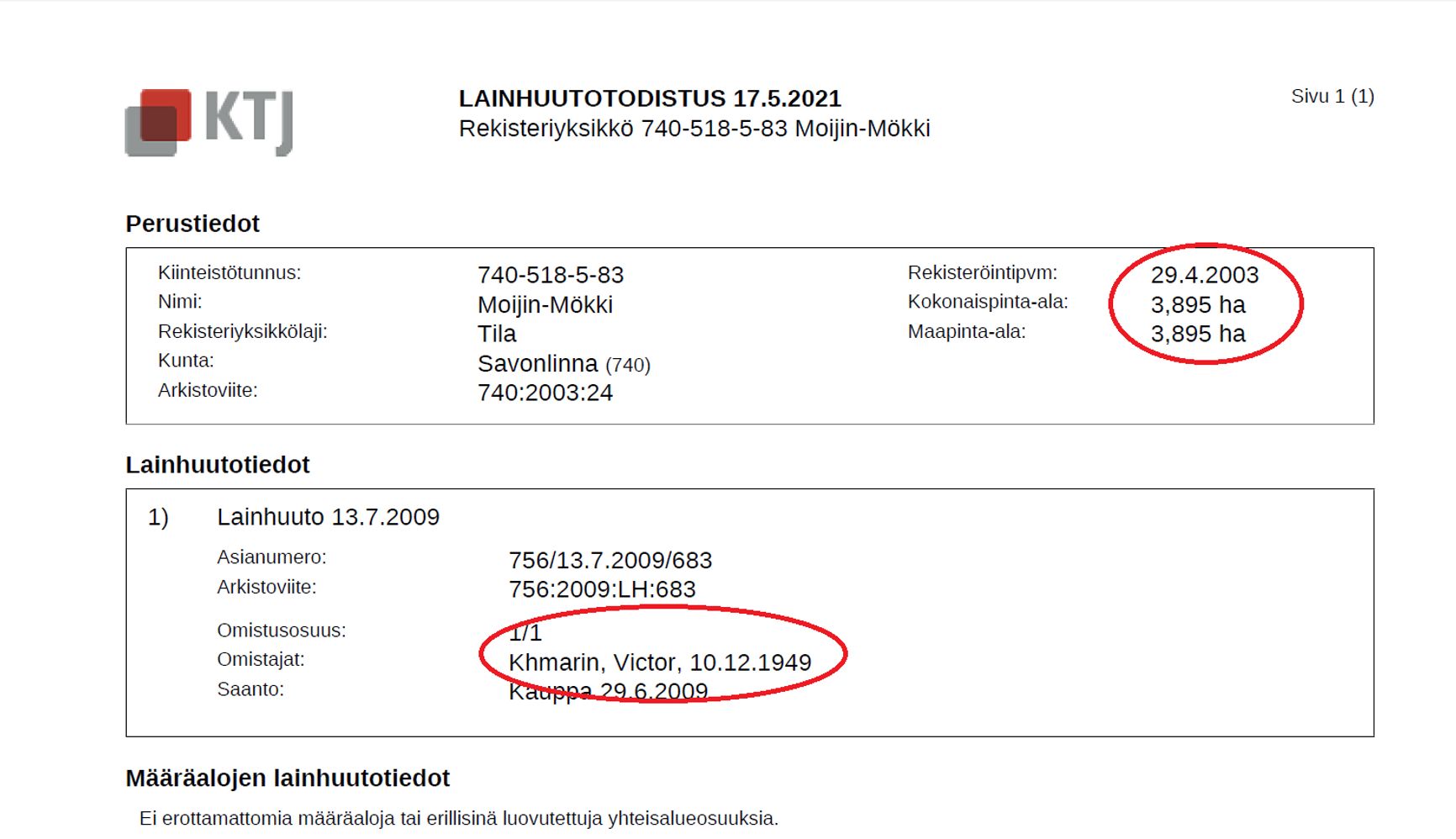

The majority of Vladimir Putin's personal friends and fellow ex-KGB officers hold prominent public offices or head major banks and state-owned corporations, making frequent appearances in the media. Only his college mate Viktor Khmarin stays in the shadows, avoiding the spotlight despite his considerable weight: he played a major part in Putin's relations with the Tambovskaya gang, actively lobbies bills in the State Duma, and finances the Kremlin's propaganda projects. The Insider has examined the lifepath of Putin's pal, paying a visit to his three-story villa in Finland. Built as a fishing retreat for Khmarin and the president, it's now been abandoned due to the change in geopolitics.
Content
Introduction
Bad blood with President Medvedev and friendship with an Islamic preacher
Propagandists
The villa at Lake Saimaa
Introduction
Viktor Khmarin met Putin in college – at the Law Faculty of Leningrad State University. They did martial arts together and went to parties. The third friend in their group, Ilgam Ragimov, currently holds real estate in Moscow worth half a billion dollars. In 1983, Khmarin was Putin's best man at his wedding and a little later, married Putin's relative, Lyubov Kruglova. After graduation, Ragimov went on to take a postgraduate course, Putin joined the KGB, and Khmarin sought employment at a law firm in Leningrad.

When Putin had worked his way up to the deputy of St. Petersburg mayor Anatoly Sobchak, Khmarin headed Vita-Kha, an entity that co-founded the Petersburg Fuel Company (PTK), which is notorious for its mob ties. Over the years, the list of PTK co-founders included organizations affiliated with Tambovskaya gang chief Vladimir Kumarin (Barsukov), criminal kingpin Gennady Petrov, and Ilya “Antikvar” Traber. Along with Vita-Kha, Khmarin headed the Chernobylets Foundation for the Disabled and the Arminiy Security Foundation and was appointed the Honorary Consul of Seychelles in St. Petersburg. The list of honorary consuls features a few more of Putin's pals: Yury Kovalchuk is the honorary consul of Thailand, Taymuraz Bolloev, of Brazil, Sergey Fursenko, of Bangladesh, and Valery Gergiev, of Luxembourg.
After Putin moved to the presidential administration, Khmarin became the go-to man for anyone seeking a prominent post in public service or looking to solve business problems. According to flight logs, the honorary consul of Seychelles flew to Moscow 39 times from 1999 to 2003, accompanied by future generals and St. Petersburg entrepreneurs who would soon strike lucrative deals.
Thus, Khmarin arranged face time with Putin for the president of the Federal Chamber of Lawyers Evgeny Semenyako, future FSB general Sergei Shemetov, antiques dealer Boris Liberman, the head of Belrusneftegaz Vladimir Yanovsky, and the chair of the board of directors at SPb Myasomolmash Viktor Solovyev. The latter was sentenced to five years in jail for fraud in 2019. As Khmarin insisted, Solovyev had stolen $2 million from him.
Bad blood with President Medvedev and friendship with an Islamic preacher
With Putin's advent to the Kremlin, Khmarin’s business struck a gold mine. His companies began winning Gazprom equipment tenders, with their aggregate yearly revenue soaring to $250 million. Notably, Khmarin avoided exposure and had his appointees run the companies. Thus, Shamizdan Aliev headed Real-Invest (eight tender wins); Alexander Kozakov and Nikolai Yakovenko co-founded pipeline equipment suppliers Telbiko and STD, and Vyacheslav Kupriyanov manned the CEO desk at Yamalinvest (three tender wins). In 2008, Moscow police investigated Yamalinvest, looking into a possible tax evasion scheme that involved straw firms. Pre-investigation review suggested that the company spent most of its earnings on Sberbank promissory notes and brokerage contract fees. However, the police never followed up on the findings.
The Insider's source at the Ministry of Internal Affairs revealed that the raid on Yamalinvest was ordered by the then president, Dmitry Medvedev, whose relationship with Viktor Khmarin was hostile. However, Putin's college mate didn't take much of a hit in this confrontation, already owning a Turkish construction company called Ladoga Insaat Pazarlama Ticaret Limited Sirketi and a small tanker fleet for liquefied gas and oil shipments (AGS Union Construction Tourism Transportation and Trading Ltd. and AGS Union maritime Ltd.).
Rumor once had it that Khmarin had brought major Turkish businesses to Moscow and handled the affairs of a popular Islamic preacher Fethullah Gülen, whom Turkish president Recep Erdogan calls his archenemy and believes to be the instigator of the failed coup in 2016. Gülen has been living in exile for years. In Russia, the FSB banned the activities of the Nurcular movement he heads, and his books were labeled extremist literature. In 2015, Moscow closed down the Atlantic International School, a Turkish private school whose supervisory board included Khmarin and his college mate Ragimov, a billionaire by then. The school’s headmaster was prohibited from entering Russia for ten years.
Khmarin's associates vehemently denied any ties to Gülen, but Elena Mikhno, a well-known lawyer, told The Insider otherwise:
“In 2010 in Saint Petersburg, Khmarin offered me to represent Turkish preacher Fethullah Gülen in several personal and business defamation cases because I’d defended a thesis on the problems of compensation for moral damage. As I realized subsequently, Khmarin intended to attract Gülen’s funds to build a logistics complex in Sheremetevo with a view of selling it.”
The Sheremetevo project never came to fruition, and while Khmarin was busy exonerating himself in Putin's eyes for his Turkish connections, Arkady Rotenberg seized the day, with his entities taking control over the airport.
Khmarin was also active in lobbying legislation that played into his hands. Thus, he got the State Duma to adopt the Far Eastern Hectare program, granting Russian citizens the right to apply for free land plots in the Russian Far East, and headed the Far Eastern Land Investment Corporation after the program launch. Khmarin is also said to have lobbied for the Law on Viticulture and Winemaking, which the State Duma passed in December 2019. At the time, Putin’s pal represented the interests of the Mirolyub Investment Group, which owned agricultural assets in the Russian south. In one of his interviews, he accused the Duma of furthering the interests of foreign wine suppliers, and in an article titled “Crimea is Ours! But What about the Land?”, he expressed his outrage at certain Ukrainians who weren’t paying their ground lease. Shortly after, companies affiliated with Khmarin signed a 49-year lease on 1,000 hectares of Crimean land and started growing grapes.

Viktor Khmarin
Besides, Khmarin’s son is also a Leningrad State University alum and a talented businessman — just like his dad. In 2021, he headed the gigantic state-owned corporation Rushydro with a yearly revenue bordering on $5.9 billion.
Propagandists
One of Khmarin's priorities is the funding of “patriotic” projects. He is on the supervisory board of the Zinoviev Center, Committee 17, and the international movement We Love Russia.
Zinoviev Center has earned the reputation of a platform for conservative pro-Kremlin political scientists. As the Center's website states, the association of Alexander Zinoviev's successors is “of particular necessity in an environment characterized by unprecedented pressure from the United States and its satellites on countries that pursue a self-sufficient development path and refuse to let the world government steer them”. The “anti-world government center” has opened subsidiaries in Belarus and China, and the supervisory board features another pal of Putin’s, Mikhail Kovalchuk.
Committee 17 focuses primarily on driving the pro-Kremlin agenda related to the war in Ukraine. As Ukrainian journalists point out, the committee includes the fugitive ex-president Viktor Yanukovych’s associates and is co-chaired by the former head of the Ukrainian interior ministry Vitaliy Zakharchenko, dubbed “the Maidan executioner” back at home.
One of Khmarin's priorities is the funding of “patriotic” projects
The We Love Russia movement was founded to “raise a patriotically inclined generation by inspiring pride in and love for their Motherland”. The Russia-loving bunch includes pro-Kremlin activists from Georgia, India, Serbia, Azerbaijan, Turkey, Bulgaria, Italy, and France. They hold round tables and symposiums, and the co-chair, self-proclaimed “people's poet” from Africa Zolani Mkiva, supports Putin’s every step and dedicates poems to him.
Alongside Khmarin, the supervisory bodies of Zinoviev Center, Committee 17, and We Love Russia include Yakutian native Mikhail Zernov, who positions himself as an “international public figure”. Two decades of working for Putin's college pal have earned him the nickname “Khmarin's Tail”. As a side project, the “Tail” used to run the People Versus Corruption party, established to offset Alexei Navalny's Anti-Corruption Foundation. In his fight against corruption, Zernov received assistance from ex-con Cossack ataman Mikhail Filin. In the lawless 1990s, Filin had multiple arrests for extortion and spent eight months on the inside in 1995 as a suspect in Vlad Listyev's contract killing case.
Mikhail Zernov (right)
Ataman Mikhail Filin
Roman Putin
In 2020, the “corruption-fighting” party was headed by Putin's first cousin once removed, former KGB officer Roman Putin. However, the president did not appreciate his relative's initiative and had the Supreme Court shut down his party.
The villa at Lake Saimaa
“You see, each of Putin's pals looked to build a recreational facility for Vladimir Putin to vacation there and help them solve problems. Thus, Konstantin Goloshchapov, whom your colleagues have dubbed ‘Putin's massage therapist’, built a park hotel in Finland. Nikolai Yegorov, another friend of the president's, built a villa not far from Khmarin's place,” says an entrepreneur from Saint Petersburg who is well-acquainted with several members of the Ozero cooperative but wished to remain anonymous.
Watch video version in Russian
Surprisingly, Khmarin's primary Finnish residence wasn't locked. The heating was on, and the elevator was running. Expensive construction materials were stocked everywhere, electrical cords were sticking out from walls, and exclusive tiles, fridges, sinks, and other bathroom equipment were lying around everywhere, still unpacked.

According to the general layout, the house features a study, a dining hall, a wine cellar, a poolroom, an underground garage, a small swimming pool, a sauna, and eight toilets. The construction team had been brought in from Russia, and a certain ‘LV’ had left threatening notes on some of the boxes: “No touching boxes without my permission.”

An extract from the Finnish register
The fishing retreat at Lake Saimaa is valued approximately at 3 million euros. Thus, land plot preparation cost 120,000 euros, the villa itself 500,000 euros, the guards’ cottage 200,000 euros, and the construction materials cost another 400,000 euros. This does not include the fishing cottage, household facilities, wooden bridges, paths, the ice cellar, and so on. The owner changed construction crews several times. Some were dissatisfied with the pay, others hated the working conditions. Finnish contractors refused to work with Khmarin too. Teemu Lautiainen, who was in charge of utility supply lines for the main house, has no fond memories of his Russian client:
“They took ages to pay the invoices, always clarifying what each invoice was for, five times in a row. We had to prove everything. We refused to work with them and shut the door on Khmarin's representative who handled his payments.”
In July 2017, Putin visited the Finnish town of Savonlinna, which is 10 kilometers from the villa at Lake Saimaa. He was welcomed by the then Finnish president, Sauli Niinistö, and his wife. As the local press wrote, the Russian leader's visit paralyzed life in the tiny town, and its residents had never before seen so many Russian security guards.
Vladimir Putin and Sauli Niinistö
Putin's cortege
According to The Insider's source in security services, while Putin was busy negotiating with his Finnish peer, one of Khmarin's assistants, also a delegation member, paid a secret visit to the villa and ordered to suspend all construction works. He told the crew that times had changed and that Putin had better things to do than go fishing in Suomi. Apparently, Khmarin had to write off the estate because he never found a buyer for the 850-square-meter house with adjacent facilities: in Finland, owning such an opulent suburban residence is simply obscene.
The author thanks the Dossier Center for its contribution to the story.